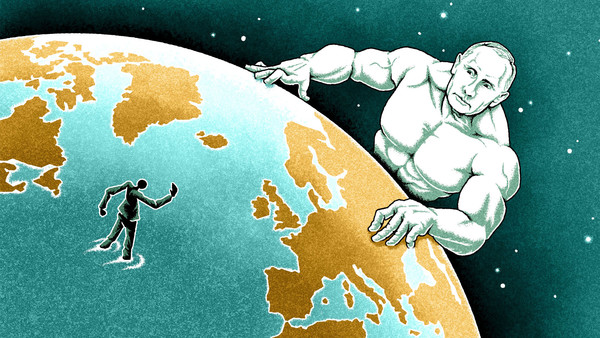Diplomacy is the US president’s preferred weapon. Now he must prove he can wield it
By Edward Luce, Financial Times
In
the dying days of the Soviet Union, President George H W Bush gave a
speech in Kiev urging Ukrainian nationalists not to provoke Moscow. US
conservatives dubbed it his “chicken Kiev” speech. Having long since
been branded America’s appeaser-in-chief, President Barack Obama
now confronts his own chicken Kiev moment. Can Mr Obama stand up to
Vladimir Putin, the Russian fox circling the chicken coop? It is unclear
whether he has the will and the skill – let alone the means – to do so.
Yet the future of his presidency depends on it. There can be little
doubt that Mr Putin wants to restore the boundaries of the Russian
empire. Mr Obama must somehow find a way to frustrate him.
It will require a very different Mr Obama from the semi-detached one
the world has grown used to. Even before Mr Obama became president,
critics accused him of appeasing a revanchist Russia. John McCain, his
Republican opponent, seized on Russia’s semi-invasion of Georgia in 2008
as an example of where he would draw the line against Moscow’s
expansionist creep. Mr Obama’s unwillingness to match his opponent’s
hawkishness chimed far better with the US public mood. Americans were
tired of the wars in Iraq and Afghanistan, and Mr Obama promised to end
them. He has done so.
If anything, Americans are even warier of entanglements today. Yet
Russia’s occupation of the Crimea dramatically changes the landscape.
Everything that Mr Obama wants – nation building at home, a nuclear deal
with Iran, a quiescent Middle East and the pivot to Asia – hinges on
how he responds to Mr Putin. At the start of his presidency, Mr Obama
offered to “reset” US-Russia relations. That is now in tatters. Along
with many others, Mr Obama has consistently underestimated Mr Putin’s
readiness to challenge the status quo. As recently as last Thursday, the
White House dismissed predictions of a Russian incursion into Crimea.
In a 90-minute phone call on Saturday, Mr Putin hinted to Mr Obama he
was prepared to extend Russia’s Crimean occupation into eastern Ukraine.
It would be naive to assume he will not.
What can Mr Obama do to prevent it? His starting point must be to
ignore the chicken hawks in Washington. Threatening a military response –
as Mr Obama’s most trenchant critics are now urging – would be
manifestly absurd. There is no US military solution to the crisis.
Drawing a “red line” between Crimea and the rest of Ukraine, or between
its eastern and western halves, would merely invite Moscow to call
Washington’s bluff. Besides, Mr Obama’s record on red lines is a poor
one. The last one he drew was in Syria,
where he promised to intervene if Bashar al-Assad’s regime used
chemical weapons on his people. Mr Assad repeatedly called Mr Obama’s
bluff last summer. Ironically, it was Mr Putin who saved the US
president from the consequences of his own rhetoric – and a humiliating
rebuff on Capitol Hill – by persuading Syria’s dictator to agree to
dismantle his chemical stockpile. That now looks to be a dead letter. In
retrospect it would have been better if Mr Obama had ordered air
strikes on Syria without consulting anyone. In any case, red lines will
only embolden Mr Putin.
Everything Obama wants – nation building at home, a nuclear deal with Iran, a quiescent Middle East – hinges on how he responds to Putin
Which leaves diplomacy. Mr Obama’s philosophy is based on the
Churchillian line that “jaw jaw” is better than “war war”. The approach
is good. But his execution has been middling at best. Too often, Mr
Obama’s stance has been to say the right thing but with little follow-
through. Just ask the people of Egypt, who remain confused about whether
Mr Obama supports democracy or not. His administration has three
policies on Egypt
– the Pentagon, which wants to maintain US-Egypt ties come what may;
the Department of State under John Kerry, which backed last year’s coup
against the Muslim Brotherhood; and the White House, which condemned the
coup but has left day-to-day decisions to the first two. On Egypt, Mr
Obama has been absent even inside Washington. He has left much the same
impression on Syria, which is now rolling back last year’s
Putin-brokered deal, and in Afghanistan, where Hamid Karzai is trashing
Mr Obama’s hopes of a treaty that would leave US forces in place.
Diplomacy is Mr Obama’s preferred weapon. Now he must prove that he
knows how to wield it. The Washington debate in the past 48 hours has
posed a false choice between setting a red line and doing nothing. But
there is plenty Mr Obama can do in between. Rallying America’s allies to
the side of Ukraine’s shaky government is obviously one. That must
include large pledges of cash. Reassuring America’s eastern European
allies that their sovereignty will be protected is another. This could
include restoring the missile defence systems Mr Obama scrapped in the
days of the “reset”. He could also accelerate plans to export US natural
gas and oil to Europe to counter Moscow’s energy stranglehold.
Above all, Mr Obama needs to convince Mr Putin that he will not be
outfoxed. That means summoning a determination he has too often lacked.
It will mean taking risks without being reckless. In 1991, Bush senior
flew to Kiev to warn Ukrainians against “suicidal nationalism”. Mr Obama
must warn Mr Putin against embarking on a course of suicidal
imperialism. In spite of everything, he remains the right person to
deliver that message. Kiev would be the perfect venue to deliver it.
Related Reading:

No comments:
Post a Comment